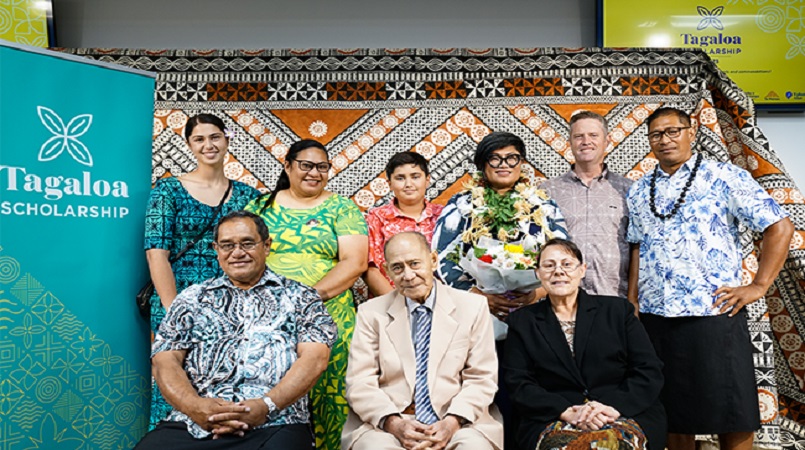
PhD candidate Wanda Ieremia-Allan would spend Sunday afternoons delivering O Le Sulu Samoa newspaper as a young girl.
She is now bound for the University of Cambridge to research the historical legacy of the publication.
Ieremia-Allan recently received the Pacific Islander Visiting Fellowship offered by Cambridge University.
She will spend six weeks at Corpus Christi College, University of Cambridge, conducting archival research for her doctorate on O Le Sulu Samoa and its role in capturing the perspectives of Pacific over time.
Her father, Reverend Elder Lale Ieremia, was one of the first Pacific tauira to attend the prestigious university in 1970.
She wants to “profile and shine a light” on O Le Sulu Samoa, a missionary newspaper that has been active for 184 years and holds a special significance for Ieremia-Allan.
“I would deliver the newspaper along with baskets of ta’ita’i [apportioned food] to elderly members of the village when I was younger.
“When visiting family, I was often asked to fetch the newspaper along with the single shared pair of reading glasses and would watch with fascination as the adults took turns poring over its contents under the fickle glare of the hurricane lamp.”
It was the first newspaper to be published in gagana Samoa (Samoan language) and tells a unique story of the Pacific over the decades.
“It’s the writing of the early people of the missionary church.
“These were the first group of Pacific printers, book binders, grassroot journalists, translators, ethnographers, teachers, nurses, artists, orators, travel writers and diarists.
“I want to draw attention to this body of scholarship and the genres of Indigenous Samoan knowledge embedded in the writing.”
She will search Cambridge’s archives for issues of the paper and for other literature written by its Pacific contributors.
“These newspapers are so rare that they actually end up surfacing in really remote and unusual places. They’re going to grant me access to the archives so I can see what they have.”
O Le Sulu Samoa had contributors from all corners of the Pacific and was mobilised by Indigenous Pacific missionaries.
“Wherever these missionaries and church workers travelled, they took the paper with them. They then sent back reports, letters, snippets of their journals and orthographies to Samoa for publication.
“They were Indigenous writers from Tokelau, Kiribati, Tuvalu, Niue, Papua New Guinea and the Torres Strait Islands that were all writing in Samoan.
“So you have this incredible history that’s been written in the Samoan language that’s only accessible to people who read Samoan, yet it is the history of all the Pacific, of everyone.”
She has already uncovered articles that document significant historical events, including the atomic bombing in Bikini Atoll and phosphate mining in Banaba (Ocean Island) and Nauru.
“It has mentions of the Indigenous Samoan lunar calendar, traditional metric systems, natural weather events, genealogy, poetry, oratory, political exile,” Ieremia-Allan says.
“And incredibly moving stories of Pacific resilience, hospitality, and generosity.
“We often hear about these events from a Pālagi perspective, but yet you don’t really hear the direct voices of our own people.”
The PhD candidate has also grown a large and highly engaged community on her Facebook page dedicated to sharing her digital collection of newspapers. She also received a Tagaloa scholarship for this doctoral research this year.
“People have been wanting to see the writing of their ancestors.”
She holds the largest digital archive of O Le Sulu Samoa newspapers, which comprises of more than 440 issues she has collated during the last three years.
She was delighted to have chanced upon the writing of her grandmother, whom she never had the opportunity to meet.
She has been busy “hitting the archives” and digitising, storing, translating and cataloging these newspapers with the intention of gifting the taonga back to its people.
“How do I give it back? Who do I entrust it with? It’s the start of a bigger project that I have planned for my postdoctoral research.
“There’s richness, there’s scholarship, there’s life in that writing that needs to see its people.”
With only six months of her PhD to go, Ieremia-Allan is in the thick of what she calls the “try not to panic” phase.
Sleep-deprived from a night of dissertation-writing, she was in disbelief after receiving the news that she had been awarded the Fellowship and says she thought she was dreaming.
Ieremia-Allan says she is honoured to be able to profile her work at the Classics, Art & History College at Cambridge in July.
“It’s not about me or my father, it’s about this intergenerational body of scholars who have been relatively unnoticed over these last 184 years.”
Photo credit Ministry of Education Caption: Wanda Ieremia-Allan joined by her aiga at the Tafaloa Scholarship Awards
